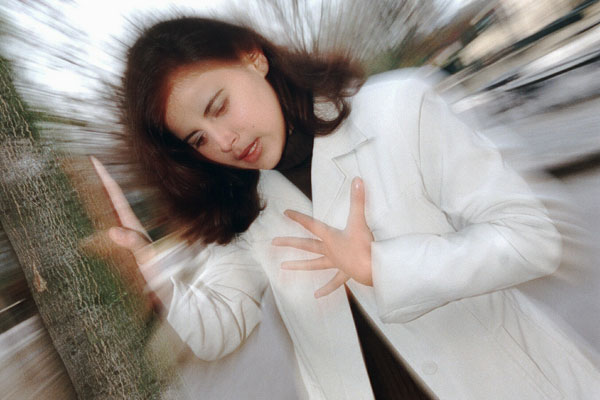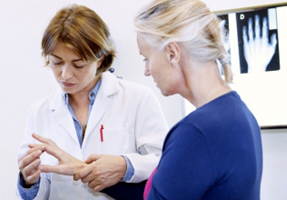Causes and Symptoms of Extrasystole
The causes that may provoke extrasystole are diverse, and traditionally they are divided into two main groups:
1. The group of causes associated with the organic heart pathology, that is cardiovascular diseases:
- Coronary heart disease. Depending on the form of the condition extrasystole may be caused either by the myocardium changes or by the combination of the organic myocardial changes with the functional ones;
- Acute myocardial infarction or heart attack. It is accompanied with the death of some part of cardiac muscle as a result of a long-term circulatory deficiency of the heart. A scar is formed in the place of the dead heart cells which leads to the formation of the pathological automatism centers;
- Cardiosclerosis – the substitution of the cardiac muscle tissue with connective tissue, which results in heart rhythm problems because of the cardiac muscle electric heterogeneity formation;
- Mitral stenosis (the narrowing of the mitral valve) causes enlargement of the left atrium and that promotes extrasystole;
- Myocarditis (myocardium inflammation). If this condition is treated incorrectly or it is not treated at all, then various rhythm disturbances as well as extrasystole may occur as complications. Quite often premature heartbeats can be the only manifestation of myocarditis;
- Rheumatic heart diseases arising against the background of rheumatism cause inflammation of all heart layers. Extrasystole is observed in about one quarter of all cases of the active rheumatic heart disease;
- Intoxication with cardiac glycosides (the drugs used for the treatment of heart failure) influences heart rhythm – the direct action of the toxic doses of these medications worsens cardiac performance and has a stimulating effect on the vagus nerve centers. Significant heart rhythm disturbances may emerge in the result of the atrioventricular conduction worsening and increased excitability;
- Chronic heart failure causes a decrease in the cardiac muscle contractility and leads to rhythm disturbances
- Arterial hypertension increases the risk of coronary heart disease development. Also, high blood pressure causes thickening of the left ventricle wall which may change the nature of the impulses conduction through this ventricle.
2. Extrasystole causes that are not associated with any cardiovascular diseases
These causes are based on the functional disturbances of the heart:
- Endocrine diseases such as thyrotoxicosis. In case of the increased thyroid gland hormones secretion, all body processes occur with the increased intensity. If a patient has thyrotoxicosis then extrasystoles are associated with the intense performance of the heart muscle;
- Disturbances of the electrolyte balance. Imbalance of the levels of the potassium, calcium, magnesium and sodium ions inside the myocardial cells and in the extracellular environment has a negative influence on the conduction system of the heart;
- Nervous system diseases (vegetovascular dystonia);
- Gastrointestinal and liver diseases. In case of the abdominal cavity organs diseases extrasystole is reflexive by nature and is caused by the action of the nervous system sympathetic divisions;
- Degenerative disk disease or osteochondrosis – extrasystole may be associated with the osteochondrosis of the thoracic and cervical regions of the spine. Changes in the invertebral discs of these regions lead to the pinching of the nerves that come out of the spinal cord. Severe pain syndrome causes dysfunction of the vegetative nervous system and, thus, provokes extrasystoles;
- Stress and resulting vascular response to the adrenaline rush. Adrenaline promotes considerable intensification of the heartbeat and heart acceleration, atrioventricular conductivity improvement and increase of the cardiac muscle automatism which may result in arrhythmias;
- Overeating and excessive consumption of coffee;
- Smoking and alcohol abuse, quite often as a result of alcohol withdrawal in cases with chronic alcoholism (abstinence syndrome);
- Drugs and intoxication caused by some poisons.
Symptoms of Extrasystole
Extrasystole does not always have an apparent clinical picture; its symptoms depend on the organism peculiarities and various forms of the condition. Most people do not feel any discomfort and know nothing about this arrhythmia until it is accidentally detected on ECG. However, there are patients who tolerate it badly.
Usually extrasystole manifests itself in any of the following ways:
- Strong heart beats;
- Feeling as if the heart stops for a bit;
- Feeling of short-term cardiac arrest followed by a strong bump in the chest;
- Pulse disturbances.
Extrasystole may be accompanied with
- Pain in the heart;
- Pale skin;
- Anxiety, qualm;
- Onset of fear;
- Feeling shortness of breath;
- Excessive sweating;
- Hot flashes;
- Weakness and fatigue.
Next chapter: Extrasystole tests and diagnosis
Featured Articles
A stroke can cause problems with communication if there is damage to the parts of the brain responsi ...
People with irregular bowel movements often complain about elevated blood pressure that doesn’ ...
A mini-stroke is a temporary disruption in blood flow to the brain, spinal cord or retina that doesn ...
It is well known that rheumatoid arthritis is an auto-immune disease that primarily affects joints. ...









